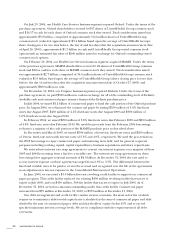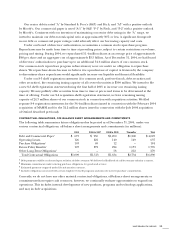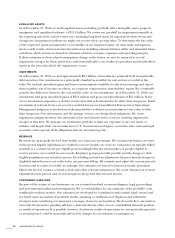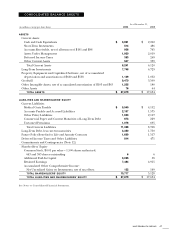United Healthcare 2004 Annual Report Download - page 39
Download and view the complete annual report
Please find page 39 of the 2004 United Healthcare annual report below. You can navigate through the pages in the report by either clicking on the pages listed below, or by using the keyword search tool below to find specific information within the annual report.
UNITEDHEALTH GROUP 37
Inflation
The current national health care cost inflation rate significantly exceeds the general inflation rate.
We use various strategies to lessen the effects of health care cost inflation. These include setting
commercial premiums based on anticipated health care costs and coordinating care with physicians
and other health care providers. Through contracts with physicians and other health care providers,
we emphasize preventive health care, appropriate use of health care services consistent with clinical
performance standards, education and closing gaps in care.
We believe our strategies to mitigate the impact of health care cost inflation on our operating results
have been and will continue to be successful. However, other factors including competitive pressures, new
health care and pharmaceutical product introductions, demands from physicians and other health care
providers and consumers, major epidemics, and applicable regulations may affect our ability to control the
impact of health care cost inflation. Because of the narrow operating margins of our risk-based products,
changes in medical cost trends that were not anticipated in establishing premium rates can create
significant changes in our financial results.
Legal Matters
Because of the nature of our businesses, we are routinely made party to a variety of legal actions related to
the design, management and offerings of our services. We record liabilities for our estimates of probable
costs resulting from these matters. These matters include, but are not limited to, claims relating to health
care benefits coverage, medical malpractice actions, contract disputes and claims related to disclosure of
certain business practices. Following the events of September 11, 2001, the cost of business insurance
coverage increased significantly. As a result, we have increased the amount of risk that we self-insure,
particularly with respect to matters incidental to our business.
In Re: Managed Care Litigation: MDL No. 1334. Beginning in 1999, a series of class action lawsuits
were filed against us and virtually all major entities in the health benefits business. In December 2000,
a multidistrict litigation panel consolidated several litigation cases involving UnitedHealth Group and
our affiliates in the Southern District Court of Florida, Miami division. Generally, the health care provider
plaintiffs allege violations of ERISA and RICO in connection with alleged undisclosed policies intended
to maximize profits. Other allegations include breach of state prompt payment laws and breach of
contract claims for failure to timely reimburse providers for medical services rendered. The consolidated
suits seek injunctive, compensatory and equitable relief as well as restitution, costs, fees and interest
payments. The trial court granted the health care providers’ motion for class certification and that order
was reviewed by the Eleventh Circuit Court of Appeals. The Eleventh Circuit affirmed the class action
status of the RICO claims, but reversed as to the breach of contract, unjust enrichment and prompt
payment claims. Through a series of motions and appeals, all direct claims against UnitedHealthcare have
been compelled to arbitration. The trial court has denied UnitedHealthcare’s further motion to compel
the secondary RICO claims to arbitration and the Eleventh Circuit affirmed that order. A trial date has
been set for September 2005. The trial court has ordered that the trial be bifurcated into separate liability
and damage proceedings.
























